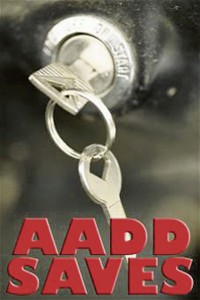Armed Forces Against Drunk Driving provides Airmen with helpful information and a unique service that benefits the wingman initiative by utilizing their own privately owned vehicles to transport Airmen when their responsible plans fall through.
The AADD program is a successful program that began in 2003 and has since saved more than 10,500 lives.

An advertisement is seen here from the Armed Forces Against Drunk Driving campaign July 11 on Ramstein. Soldiers, Airmen, Sailors and Department of Defense civilians work together and devote their free time and fuel Friday and Saturday nights to provide rides for military members, which helps prevent accidents and even deaths caused by driving under the influence.
The organization’s goal is to prevent accidents and even deaths caused by driving under the influence. The success is based on support from the KMC joint forces: Soldiers, Airmen, Sailors and Department of Defense civilians who devote their free time and fuel Friday and Saturday nights to provide rides for military members.
AADD is not intended as a first-resort plan. Service members are encouraged to establish a game plan before heading out for the night, such as appointing a designated driver, bringing emergency cash for a cab or calling a sober friend for a ride.
If all else fails, AADD is an option. When an individual calls AADD they are asked for their first name, whether they drive a standard or automatic and a possible contact number in case the AADD driver needs to reach them. AADD sends out a team of two; the first volunteer drives the caller’s vehicle, accompanied by the caller. The second volunteer follows the first car in for a smooth arrival to the caller’s destination and takes the fellow volunteer back to the call center.
Friday and Saturday nights are busy, but when there are no calls AADD provides entertainment for the volunteers. The facility has movies, games and wireless Internet. It’s located on Kapaun Air Station on the second floor of Bldg. 2783, near vehicle registration and is open from 11 p.m. to 5 a.m. Anyone can volunteer and volunteers are not required to pull full shifts.
Below is information from the AADD website to help ensure safe driving for service members and civilians.
If you are under the influence of any alcohol or intoxicating substances (inhalant, depressant, hallucinogen, stimulant or narcotic drug) and your primary plan has changed.
• Plan A: Have a designated driver who is not going to drink
• Plan B: Set money aside for a taxi ride home
• Plan C: Call a wingman, a friend or a supervisor
• Plan D: Get a hotel room that is close to where you are going to drink so you can walk
• Plan E: Drink at a bar that offers a taxi ride home at no charge (30 bars in town do this)
What is considered a DUI in Ramstein?
• DUI = .08 percent > blood alcohol content
• DUI = .001 percent > BAC if driver is under 21 years of age
• Refusal to submit to a breath/blood test carries the same penalties as if convicted of a DUI
• A person is driving under the influence if he/she operates, drives or is in physical control of a motor vehicle, watercraft or aircraft while under the influence of an alcoholic beverage, inhalant, depressant, hallucinogen, stimulant or narcotic drug.
What is considered Operating Under the Influence?
• A person is under the influence of alcohol or any controlled substance with the intention or opportunity to control a motor vehicle (BAC is not required)
Examples:
• Keys on person while sitting in a vehicle (front or back seat)
• Sitting in the back of a pickup truck
• Subject to anchorage prosecution and/or military administrative actions (listed below)
The consequences of an off-base DUI (first offense):
• Minimum of 72 hours in jail
• 30-day vehicle impound
• Fees may include: towing, storage, administrative processing, interlock device installation, court fees, sentencing, and imprisonment (Average of $22,000 to $24,000 for first DUI)
• Minimum of 90-day license revocation (revocation time increases for subsequent DUIs)
• Military administrative actions:
• 12-month revocation of on base driving privileges
• Letter of counseling, admonishment or reprimand
• Administrative demotion
The consequences of an on-base DUI:
• 12-month revocation of on base driving privileges (0.05-0.08 percent > BAC)
• Administrative Actions: LOC/LOA/LOR, unfavorable information file, control roster, administrative demotion and/or administrative separation
• Punitive actions: Article 15 (reduction in rank, forfeiture of pay, extra duty, restriction to base) or court martial (punitive discharge, confinement, hard labor without confinement, forfeitures)
Maximum punishment for an on-base DUI:
• Resulting in personal injury: dishonorable discharge, forfeiture of all pay and allowances, and confinement for 18 months.
• No personal injury involved: bad-conduct discharge, forfeiture of all pay and allowances, and confinement for six months.
Education and treatment
• All offenders are required to attend education or treatment as recommended by an alcohol assessment. First offenders must attend 8 to 15 hours of classroom instruction at a cost of $20 to $150 per hour.
For more information or to volunteer, ask your squadron AADD representative. If you do not have a representative, email kmc.aadd@ramstein.af.mil.


